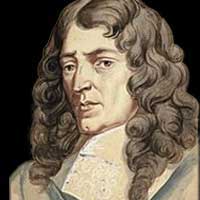Marc-Antoine Charpentier Biography - A Very Quick Guide
Marc-Antoine Charpentier (1643 - February 24, 1704) was a French composer of the Baroque era. He was a prolific and versatile composer, principally of sacred vocal music, and was one of the most famous contemporaries of Jean-Baptiste Lully.
| Contents |
Life
He was born in or near Paris. Little is known of his early life, and even the approximate date of his birth is questioned; it is known that he was a 'young man' when he studied in Rome, probably between 1662 and 1667. While in Rome he studied with Giacomo Carissimi; an old legend of his going to Rome to study painting, prior to his musical talent being discovered by Carissimi, is undocumented. Certainly he acquired a solid knowledge of contemporary Italian practice, which he brought back to France.
Most likely he worked for the Duchess of Guise on his return to France, as her mâitre de musique—music master—and singer, until her death in 1688. During this time he composed a considerable quantity of dramatic secular vocal works, including psalm settings, hymns, a Magnificat setting, a mass, and motets (which he called oratorios, confusingly).
Beginning around 1672, he worked with Molière after Molière's falling out with Jean-Baptiste Lully.
Music, style and influence
His compositions include oratorios, masses, operas, and numerous smaller pieces which are difficult to categorize. Many of his smaller works for one or two voices and instruments resemble the Italian cantata of the time, and share most features except for the name: Charpentier calls them air sérieux or air à boire if they are in French, but cantatas if they are in Italian.
Miscellaneous
The prelude to his Te Deum, H. 146, a rondeau, is very well-known as the signature tune for the European Broadcasting Union, heard in the opening credits of the Vienna New Year's Concert and the Eurovision Song Contest.
Charpentier's works
Charpentier's compositions were catalogued by Hugh Wiley Hitchcock. They are often referred to by H (for Hitchcock) number.
Operas
- Les Amours d'Acis et Galatée (1678)
- La Descente d'Orphée aux Enfers (1686-1687)
- Le Jugement de Pâris (1690)
- Philomele (1690)
- Médée (1693)
Biblical tragedies
- David & Jonathas (1684)
- Celse (1687)
Pastorales
- Actéon (1684)
- La Couronne de Fleurs (1685)
- La Fête de Ruel (1685)
- Il faut rire et chanter: Dispute de Bergers (1685)
- Le Retour de Printemps
- Cupido Perfido Dentr'al Mio Cor
- Petite Pastorale Eglogue de Bergers
Pastoraletta
- Amor Vince Ogni Cosa
Tragedies
- Circé (1675)
- Andromède (1682)
Comedies
- La Comtesee de'Escarbagnas (1672)
- Le Médecin malgré lui (1672)
- La Fâcheux (1672)
- L'Inconnu (1675)
- Les Amours de Vénus et Adonis (1685)
Comédies-Ballet
- Le Mariage Forcé (1672)
- Le Malade Imaginaire (1672)
- Le Sicilien (1679)
Ballets
- Polyeucte (1679)
Divertissements
- Les Plaisirs de Versailles (1682)
- Idylle sur le Retour de la Sante du Roi (1687)
Musical Idylls
- Les Arts Florissants
Interludes (Intermèdes)
- Le Triomphe des Dames (1676)
- La Pierre Philosophale (1681)
- Endymion (1681)
- Dialogues d'Angélique et de Médor (1685)
Sonatas
- Sonates à huit
Top Pieces on 8notes by Marc-Antoine Charpentier
